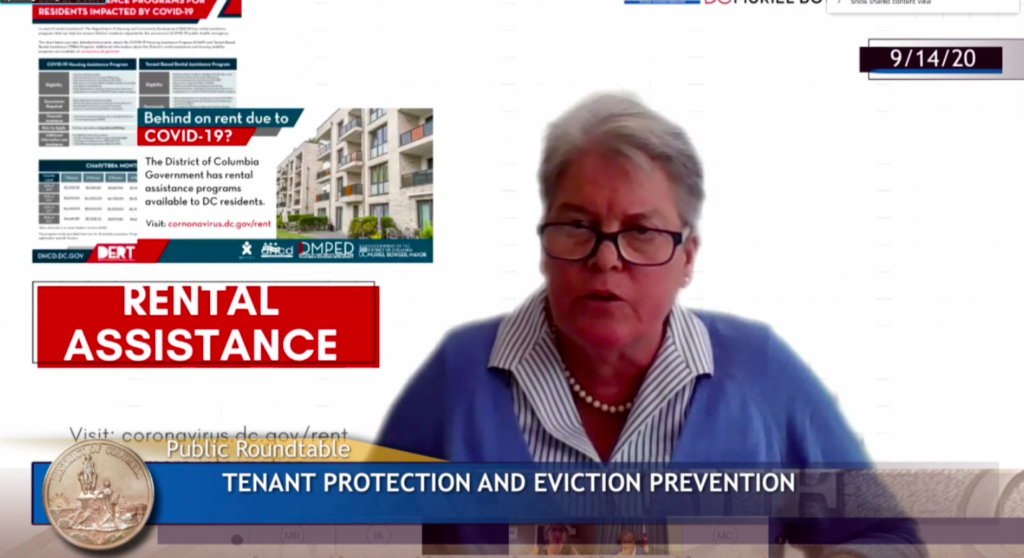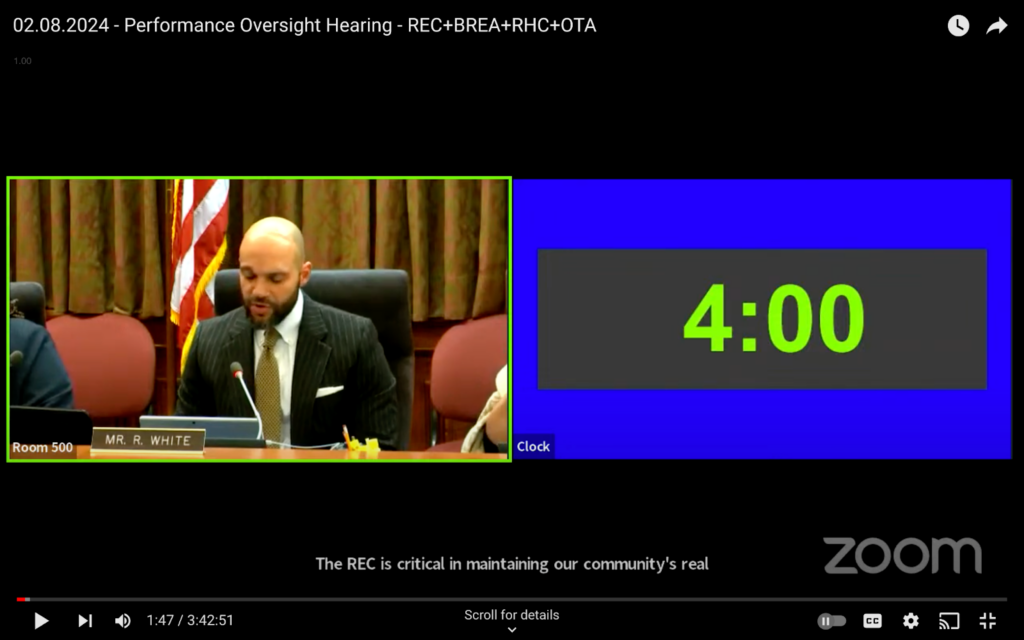Emergency rental assistance remains available for people struggling to make ends meet in D.C. Several District funds designed to help residents during the COVID-19 pandemic have been underutilized according to the Department of Housing and Community Development (DCHD), which is encouraging residents to continue to apply.
These programs include the permanent Emergency Rental Assistance Program (ERAP) as well as two new resources specifically designed for residents who have been economically hurt by the coronavirus pandemic: the COVID-19 Housing Assistance Program (CHAP) and the DHCD COVID-19 Tenant-Based Rental Assistance program.
DCHD Director Polly Donaldson stressed the continued availability of these programs during a Sept. 14 D.C. Council roundtable.
“The most important thing I want you to take away from the rest of my testimony today is that if you or someone you know are threatened with eviction, there are protections at the local and federal level that will protect you,” Donaldson said.
According to Donaldson, the lower-than-expected utilization of these programs is likely due to tenants’ confusion about whether they qualify, along with temporary relief provided by D.C.’s eviction moratorium, which was enacted before the national moratorium and is in place until 60 days after the mayor declares the COVID-19 public health emergency to be over.
A limit on how often residents can apply for aid, especially from ERAP, may also be causing tenants to delay applying until their situation is untenable, according to Beth Mellen Harrison, a supervising attorney from Legal Aid D.C.
The COVID-19 Housing Assistance Program
CHAP offers three months of rental assistance to low-income tenants. To qualify, households must earn less than 80% of the District’s median family income, which translates to about $100,800 or less annually for a family of four and $70,550 or less annually for an individual. A complete list of qualifying incomes can be found here. The amount each household will receive is based on income and household size and can be used for up to three months of overdue rent, with an option for eligible applicants to apply for an additional three months of aid.
Applicants must also have lived in their unit since Feb. 29 of this year and be able to demonstrate they are behind on rent at least partially because of the pandemic. To apply, residents should go to the central intake portal, where they will be directed to a community organization to handle the application and payment process.
CHAP began taking applications in June. As of the roundtable, Donaldson said just under 500 households have received or been approved to receive funds.
The COVID-19 Tenant-Based Rental Assistance Program
DHCD is using federal funding from HUD’s HOME Investment Partnerships Program to help low-income tenants keep up with current rent and to pay back rent through the Rental Assistance Program. An estimated 400 approved households will receive aid from this fund for at least six months and for as long as two years, based on available funds.
Applicants must have lived in their unit since Feb. 29 of this year and be able to demonstrate they are delinquent on rent. Only applicants who make at or below 60% of the median family income ($52,900 for an individual, $75,600 for a family of four) and live in a rental property with 50 units or less are eligible.
To apply, tenants should contact either of the nonprofits implementing the fund: Housing Counseling Services or the Latino Economic Development Center. This program is projected to be fully subscribed to by November.
The Emergency Rental Assistance Program
ERAP can be used for overdue rent if a household is facing eviction, including money for late fees and court costs, or can cover the security deposit and first month’s rent at a new residence for those who would otherwise face homelessness. The program is limited to one use per household per year, and the amount of assistance provided is based on income and available resources.
Residents whose monthly income is at or below 125% of the federal poverty level ($1,329 for an individual and $2,729 for a family of four) can apply through an online portal or by contacting any of the organizations listed on this page.
ERAP funds are typically exhausted by mid-September. However, the fiscal year 2021 budget nearly doubled its funding, with $14 million available in assistance for the year starting Oct. 1. The council added $6 million of this funding to the Mayor’s proposed budget.
“ERAP runs out of money every year, so even in a year without COVID it would be good to increase the ERAP budget,” Kate Coventry, a senior policy analyst at the D.C. Fiscal Policy Institute told Street Sense Media. In fiscal year 2019, four out of the six organizations that distribute the funding ran out of funding before the end of the fiscal year. The two organizations that did not exhaust their funding only had a combined $227 remaining, far below the average award amount of $2,936.
However, Coventry said the new ERAP budget combined with CHAP would still not fully cover the assistance needed to ensure tenants who can no longer pay their rent can remain housed in the long-term, even though they are temporarily safe from eviction.
The D.C. Fiscal Policy Institute is part of a coalition of organizations that advocated for an additional $12 million in ERAP funding, half of which was adopted by the council.
How do we avoid an eviction crisis?
Housing providers are also required to offer a payment plan for missed rent to any tenants who can demonstrate their household has been negatively impacted financially due to COVID-19, according to emergency legislation D.C. Council passed in May. These plans will be in effect until one year after the local public health emergency ends.
Despite the new programs and the expansion of ERAP, both councilmembers and the public cited concerns at the roundtable about an unprecedented wave of evictions when the moratorium ends. According to court eviction data, over 2,000 eviction actions have been filed since the moratorium went into place and landlords have continued to provide eviction notices to tenants. The week after this came to light at the roundtable, D.C. Council unanimously voted to stop landlords from providing eviction notices during the pandemic. The issuance of notices confused many tenants, some of whom chose to leave their current housing, thinking an eviction was near.
[Read more: DC landlords can no longer provide eviction notices during the pandemic]
This looming crisis for many residents is part of what prompted At-large Councilmember Anita Bonds, the chair of the Committee on Housing and Neighborhood Revitalization, to hold the roundtable.
“These actions are good first steps but there’s a lot more work to be done,” Bonds said of the existing programs.
Some of this additional work, as outlined by D.C. Chief Tenant Advocate Johanna Shreve, could include a legal assistance fund to help tenants handle illegal eviction attempts. Shreve also urged an extension of the current eviction moratorium to 120 days after the end of the public health emergency. “They’re going to need more than 60 days to get their financial house in order,” Shreve said of the current eviction timeline.
Both of Shreve’s suggestions were echoed by Jennifer Berger from the D.C. Attorney General’s office.
Members of the public spoke in favor of more drastic action, such as canceling rent missed during the pandemic and shifting the burden for applying for assistance to landlords, rather than tenants. Nearly everyone who spoke agreed more must be done to stem the coming wave of evictions.
“The costs of doing nothing are going to be much higher for the District,” said Harrison, the Legal Aid D.C. attorney.








